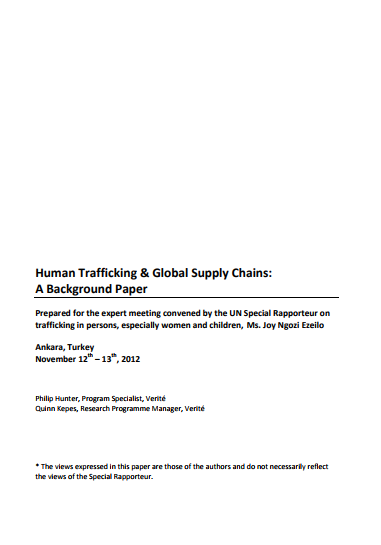This paper has been prepared as a reference document for the expert meeting convened by the UN Special Rapporteur on trafficking in persons, especially women and children, Ms. Joy Ngozi Ezeilo, who devoted her 2012 report to the UN General Assembly to the issue of trafficking in supply chains (A/67/271).
The paper presents an overview of the ways trafficking in persons and related human rights abuses such as forced labour can impact global trade and the production chains of multinational enterprises. The paper examines where brands and supply chains can be vulnerable to risks of human trafficking, and the different ways that these risks can manifest themselves across diverse industries and sectors.
The paper argues that human trafficking is a significant threat to supply chain security, and that this threat can exist for companies at multiple levels. Brands are advised to take effective and sustained action, lest they leave themselves vulnerable to potential legal, reputational, trade-related and investment-based challenges in the future. The paper also presents the many ways that companies have responded to human trafficking. It outlines the new policies, capacity building programmes and transparency initiatives that have developed to mitigate these risks, as well as the emerging civil society and multi-stakeholder efforts to promote consumer and public awareness. The paper complements these initiatives with a roadmap of recommendations and proposals to promote effective and sustained engagement, concluding with a call to action and a draft set of Ethical Principles for a Trafficking-Free Supply Chain that businesses could voluntarily endorse.

